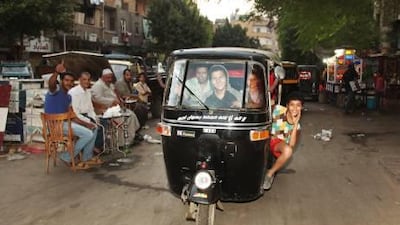CAIRO // It has been about four years since tuk-tuks became commonplace on Egyptian streets and reactions to the cheap three-wheeled motorised rickshaw range from outright contempt to breathless praise.
Their drivers are overwhelmingly young men with little money and often no job. They have been criticised for their sometimes loutish behaviour and casual disregard for pedestrians and larger vehicles. Some critics say the drivers use them to commit crime.
Nonetheless, the tuk-tuk has emerged as a durable solution to many Egyptians' transportation woes. In urban areas, they have brought the miracle of motorised transport to narrow alleyways and provided jobless men with work as impromptu taxi drivers.
Outside the cities, the tuk-tuk has lessened the time spent travelling between far-flung farms and city centres, offering rural residents - particularly women - an inexpensive and practical means of going to markets and visiting family members.
The parts for the vehicles are made in India and the tiny engine's puttering sound spawned the name - tuk-tuk, originally coined in Thailand.
Its defenders point to the country's thousands of tuk-tuks as a massive employment - even entrepreneurial - opportunity for Egypt's legion of out-of-work young men.
Its detractors see it as a source of low-wage child labour, with children as young as eight driving tuk-tuks rather than attending school.
"So what is the choice? You have to send your kid to work. Do you send him to the mechanic down the road or do you buy him a tuk-tuk?" asked Mounir Nakhla, the managing director of Mashroey, a micro-finance organisation that, since spring, has worked with tuk-tuk dealers to provide hundreds of loans for aspiring owners.
All of the loans, he says, have been paid back.
If children are operating tuk-tuks, or motor rickshaws as they are often called in India, that is because the government doesn't regulate the vehicles properly, said Mr Nakhla.
"Teaching a trade can outweigh the benefits of education in Egypt. It's sad but it's true," he said of his country's poor record of providing work for its millions of well-educated youth. "You have a lot of people who get an education and are jobless, compared with an 18-year-old or someone who started a job at 15 and now he can sustain himself."
Ghabbour Auto, Egypt's largest car-assembly firm, began importing tuk-tuk components from India in 2002. They were not legal on Egypt's streets until a 2008 law established licensing and registration requirements.
Nevertheless, local authorities have often sought to limit tuk-tuks. Many Cairo residents consider them another aggravation on already clotted roads. The devices remain illegal in the Governorate of Cairo, for example, and a maximum of 6,000 are allowed to be registered in the Governorate of Giza, where certain affluent neighbourhoods remain off-limits, said Mustafa Khatib, the chairman of the local council of the Giza Governorate.
"They said, basically, it doesn't look good for the capital. That's the main reason. You want to maintain a certain image of Cairo, so that's why they banned the tuk-tuk," said Kamal Khedr, a consumer goods equity analyst for Beltone Financial, a financial services firm. "But it is definitely growing… It's affordable when you've got 40 per cent of people in Egypt living below the poverty line."
Viewed from that perspective, it is perhaps more remarkable that the tuk-tuk did not arrive in Egypt sooner. In many ways, Egypt's economy and infrastructure resemble India, whose streets rattle with the noise of about three million three-wheelers nationwide.
"We saw there was a lot of similarity between India and Egypt in terms of markets in the sense that there are a lot of rural population here in Egypt, there are a lot of narrow roads in Egypt and people were looking for an opportunity to buy a low-cost vehicle," said Jay Narayanan, the general manager of Cairo Individual Transport Industries (CITI), a subsidiary of Ghabbour Auto and a partner of Bajaj, the world's largest tuk-tuk manufacturer.
Despite their obvious appeal, tuk-tuks did not take on immediately, said Mr Narayanan. When CITI added tuk-tuks to their already robust business in two-wheeled vehicles in 2002, they sold only about 10 units. Since then, the numbers have increased dramatically from 5,357 units in 2004 to 42,592 in 2009. Ghabbour continues to hold an 80 per cent market share of the tuk-tuk business, said Mr Khedr of Beltone.
All of the leather-topped three-wheelers for sale in Egypt are versions of the same standard model: a single-cylinder, four-stroke, petrol-powered engine that can bring the 1.7-metre tall vehicles to a maximum speed of 55 kph.
While Mr Narayanan expects sales to continue to rise, a lack of financing and spotty government regulation remain significant barriers, he said. Local governments either ignore tuk-tuks entirely or limit the numbers.
Financing also is a challenge. Whereas Indian banks finance tuk-tuks in much the same way they lend money for a car, Egyptian commercial lenders have yet to tap the tuk-tuk market, perhaps because of an perception that tuk-tuk drivers are young, irresponsible hoodlums.
Only Mr Nakhla's Mashroey microfinancing schemes offer the upfront cash needed to enter the business. Until Mashroey's partnership with Ghabbour began this spring, most owners scrounged the needed cash from family and friends.
"I had general managers of banks calling me up and telling me, 'Mounir, you're going to lose a lot of money. These are all criminals', " said Mr Nakhla, who lends to tuk-tuk buyers at a "standard micro-finance rate" of about 15 to 16 per cent interest. "But I find them to all be honest men. They're just normal people. This stigma, this stereotype, is very unfair."

